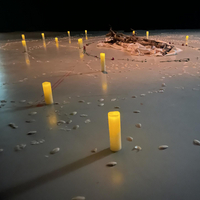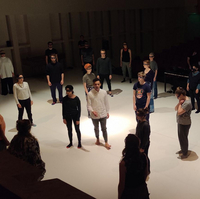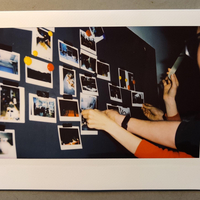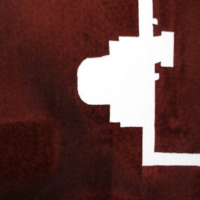An impression of Unlearning the Human
It was the Saturday after the terrible storm on Friday. Some thirty people who needed train nor tram gathered in the Tolhuistuin accross the IJ. They were students from all AHK academies, teachers and staff, coming together for a Saturday about Unlearning the Human.

Relating to the non-human world
Unlearning the Human asked the question "how can the arts contribute to addressing anthropocentrism and the violence towards non-human life that this value system enables?" And: "what can we learn from an encounter with an alternative mode of relating to the non-human world?" The Artist in Residence who took these questions as a starting point, together with Laura Cull, lector at the ATD, was Amanda Piña, a Chilean-Mexican choreographer and researcher, participating in the THIRD programme of DAS Research (Now: ATD Lectorate) at the ATD. She invited a first nations elder and shaman from the Wixarika nation in the west of Mexico, with whom she’s been working for many years, to come and share his knowledge and practice with the group. She also invited the Austrian-Afghan philosopher Fahim Amir whose research deals with animal and human relations, and ecology.
Mix of rituals, physical exercises, lectures and discussion
The result was an intense experience that mixed rituals, physical exercises, lectures and discussion. And like last time an amazing thematic lunch was served – in paper bags for two. One of the exercises invited participants to become bodies of earth through poetical visualisation, embodiment and dance and then share their experiences:
“We were a Sahara desert. It was cold and windy. There were lizards and we were moving like the lizards. We were led by the wind and sandstorms, that’s what we were…”
“We were a cloud above a beautiful valley. We were born out of nothing, and then we grew and grew. Parts of us were falling apart, we were trying to stay together. At some point we regained a lot of energy and then we let it go as rain. And somehow we disappeared again..”
“We were a bubbling brook or stream from the mountains. First we were very small with a lot of speed. Then we started to grow more and become bigger. The weather also had impact, so there were waves and they got bigger and smaller, that was dynamic …”
“We were a meadow with little human interference. We could really feel the wind blowing through our grass and feel the worms nibbling at our roots…”
Indigenous ontology
One of the threads during the day was the acknowledgment, not just of the existence of different worldviews or knowledge systems that have been endangered by European coloniality but have managed to persist, but also of the need to leave space between them, that is: not to assume that one can fully understand, in this case, an indigenous ontology. And that, as was discussed at different moments during the day, could be the role of art: to enable an ecology of forms of knowing; working in the space between western and non-western knowledge systems; being inspired by these others forms of knowledge, trying to translate their values, but never denying their difference...
Student responses:
"I enjoyed the workshop - full of thinking, happiness, and closer understanding of what it is to be in a human body, the relationship between us, animals, and nature - so, in other words, a relationship between anything in the world through a lens of human consciousness."
"It was a day of reframing notions that I thought to be familiar with, making me more aware of the plurality of perspectives and narratives."














